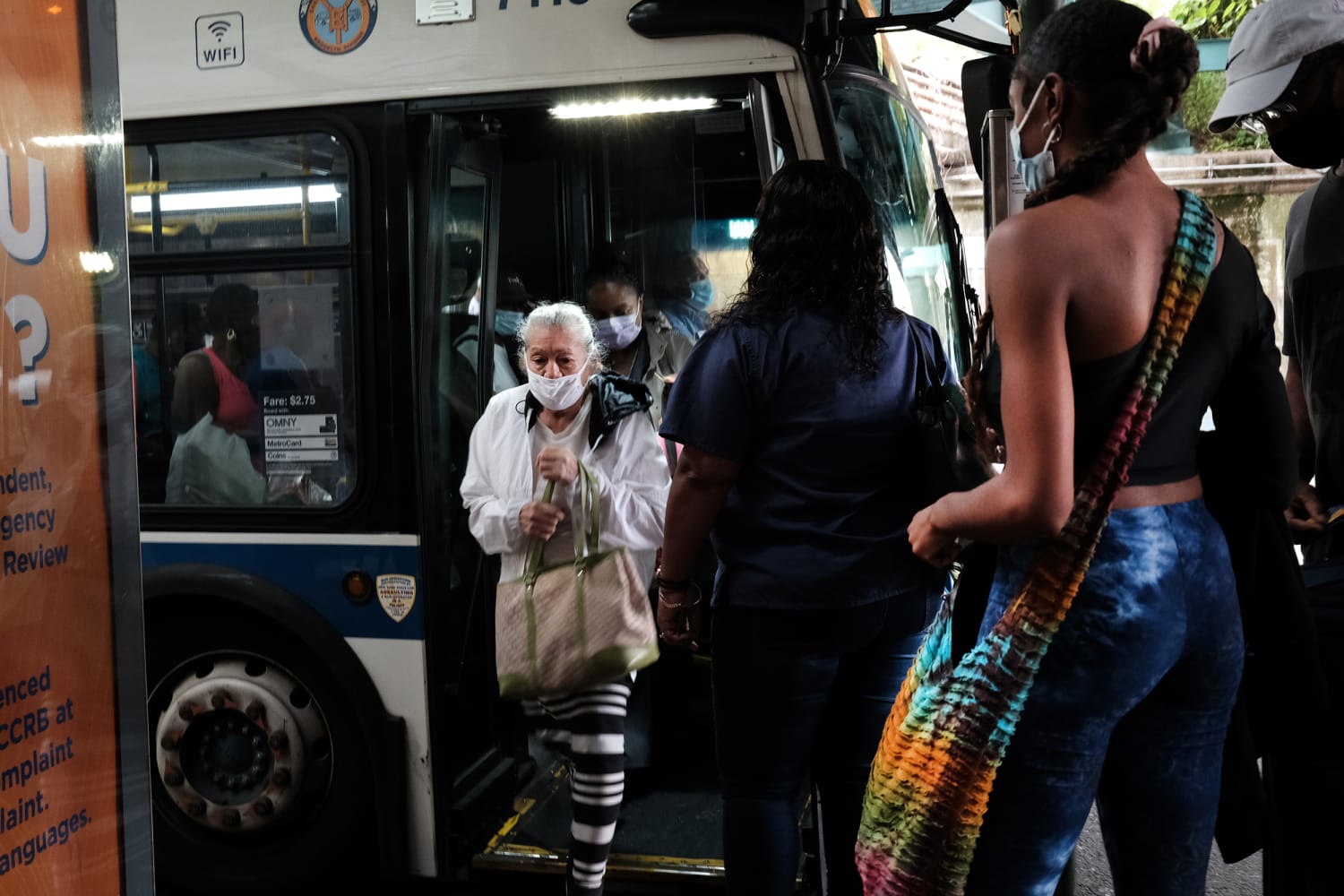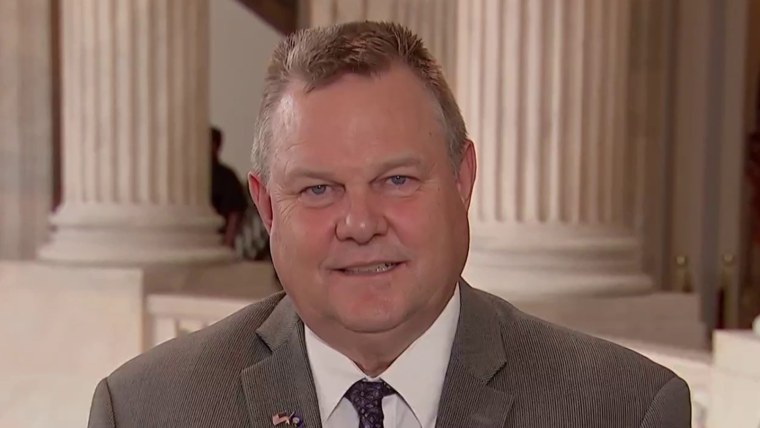WASHINGTON — Senators say they’re on the brink of finalizing a huge, bipartisan infrastructure deal. But there’s a major dispute holding it up: how much money to spend on public transit.
Sen. Jon Tester, D-Mont., said the main point of contention in the five-year, $579 billion package was “the ratio” of money distributed between highways and public transit.
Senators and aides say Democrats want 80 percent of the funds allocated for transportation projects for highways and 20 percent for transit, citing past precedent. Republicans want less than 20 percent to go to mass transit, saying that ratio hasn’t been fixed.
“They don’t see the role for transit that we’ve seen bipartisanly for nearly 40 years,” Sen. Sherrod Brown, D-Ohio, said Thursday. “They are asking for significantly less money. … The Trump party has changed. They don’t want to invest in public transit the way this country has, really, since the Reagan years.”
“We need to be investing now in cleaner buses. … We need zero-emissions buses. We’ve got to begin that process now,” he told reporters. “Frankly, Republicans are standing in the way. I hope we can get a bipartisan deal. If we can’t, we do these things in the reconciliation bill.”
Sen. Rob Portman, R-Ohio, the leading GOP negotiator, said Republicans have made a “generous offer” that provides a “significant increase” in transit money over the next five years.
“Transit funding has not yet been resolved,” he said. “Democrats, frankly, are not being reasonable in their requests right now.”
The dispute comes as Senate Majority Leader Chuck Schumer, D-N.Y., vows to finish the legislation before the chamber breaks for a recess scheduled in August. Negotiations have been ongoing for a month since a group of five Democrats and five Republicans announced an agreement on an infrastructure framework at the White House with President Joe Biden’s endorsement.
For Biden, the bill represents an opportunity to make good on his pledge to unify the parties around a major goal. For GOP senators, infrastructure provides a rare opening to work with a Democratic president and deliver for constituents, without much of a risk of backlash from their ideological base.
But the issue of transit has run into a larger political divide between Republicans, many of whom represent rural parts of the country where cars tend to be the only viable way to get around, and Democrats, who disproportionately represent more urban areas that are heavily dependent on public transportation. Progressives have pushed for a higher ratio of transit funding in infrastructure talks to make the transportation sector greener.
“They’re kind of hung up on it right now,” Senate Minority Whip John Thune, R-S.D., told reporters of the Democratic negotiators on Thursday. “It’s just an issue that most of — a lot of people who don’t have transit don’t care about and don’t like the way that the funds get allocated and divided.”
Thune said it was “one of the last hang-ups,” while also identifying broadband as an area where negotiators were finalizing details.
A senior Republican aide close to the talks said apart from “the big outstanding issue” of transit money, there were “just a few minor fires here and there, but other than that I think it’s done.”
A Democratic aide familiar with negotiations said there are a “number of issues still open in negotiations,” including broadband, rescission of unspent Covid-19 funds and matters involving the Davis-Bacon Act on labor and wages.
House Democrats push back
House Democrats, who aren’t directly involved in the talks but are receiving updates, have been sounding the alarm on the issue of public transit, too — and made it clear that their votes are dependent on satisfactory resolution.
Some of them say transportation funding is one of the main ways to tackle climate change and that the country’s highway and transportation polices must be reformed to address it. Transportation accounted for 29 percent of greenhouse gas emissions in 2019, the Environmental Protection Agency said.
“If you’re going to take on climate but you’re not dealing with the biggest polluting factor in terms of transportation, what are we doing? So that’s the issue,” said Rep. Pramila Jayapal, D-Wash.
Senate Democrats “have to be conscious that if they move too far to the right to get 10 Republicans, they will lose Democrats in the House for sure,” Jayapal said.
House Transportation Committee Chairman Peter DeFazio, D-Ore., and other Democratic lawmakers sent a letter to Speaker Nancy Pelosi, D-Calif., and Schumer this week demanding increased funding for transportation.
“We won’t resolve these problems by continuing the status quo and spending more money through a broken and outdated system. We can’t afford to lock in failed highway-centric policies for another five years,” the House Democrats wrote in the letter.
Rep. Jared Huffman, D-Calif., said there are worries in the caucus.
“I want to stop short of throwing out a bunch of ultimatums and red lines, but concern? Absolutely,” he said.
‘The calendar is limited’
Senate Majority Whip Dick Durbin, D-Ill., and Tester both described early next week — ideally Monday — as a target to begin advancing the proposal in the chamber.
“If it isn’t, that’s going to be another week off vacation. I told these guys, the calendar is limited,” Tester said.
Despite the dispute, Portman sounded optimistic that a deal would be reached, hopefully by Monday, which he said should include the final cost analysis from the nonpartisan Congressional Budget Office.
“I’m excited about getting this thing done. It’s great for the country. It’s the right thing to do for our infrastructure, which is crumbling. Everybody knows we need to do it,” he said.
Sen. Kevin Cramer, R-N.D., said he trusts the negotiators and added that when it comes to paying for the legislation, “that path has been cleared, which was major.”
Sen. Susan Collins, R-Maine, a member of the working group, said they are “very close” to finishing.
“We had meetings last night. We’ve had meetings from early this morning,” she said Thursday, adding that the group has effectively agreed on how to finance the deal and are writing the text. “I’m optimistic that by working through the weekend, we’re going to be able to come up with a proposal on Monday.”
But Collins added: “I realize it’s never over till it’s over.”
Source: | This article originally belongs to Nbcnews.com











